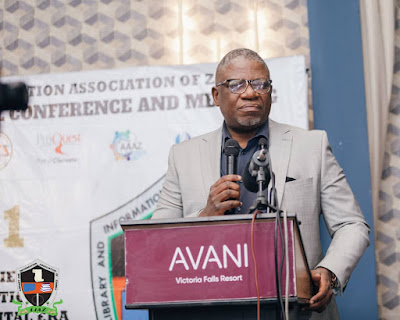By Pauline Namulomba Nchemba
In a rapidly digitizing world, information is no longer a passive resource — it's a driver of institutional growth, innovation, and national progress. From April 23rd to 25th, 2025, the Library and Information Association of Zambia (LIAZ) brought this message to life at its groundbreaking Training Workshop on the Strategic Role of Information in Institutional Development, held at Mika Convention Centre, Chongwe.
Under the theme “Strategic Information Management: Driving Institutional Development and Innovation,” the workshop gathered Zambia’s Directors, Librarians, Records Officers, and Information Professionals for three days of knowledge exchange, reflection, and action planning.
Why This Workshop Mattered
Too often, information professionals work in the shadows, their critical contributions to policy, operations, and service delivery underappreciated. This workshop set out to change that — by rethinking the value of information in institutions and its alignment with Zambia’s 8th National Development Plan (8NDP).
Key goals included:
• Strengthening collaboration between management and information staff;
• Exploring digital innovations that improve institutional service delivery;
• Developing actionable information governance plans;
• Building bridges between institutional goals and national development priorities.
The turnout? A strong 48 participants, including 6 institutional Directors, 2 leading facilitators (Mr. Luanga and Mr. Miti), and a vibrant team of LIAZ staff coordinating the event.
A Day-by-Day Journey Through the Workshop
Day 1: Building Bridges Between Leaders and Information Professionals
The opening ceremony was vibrant, with a warm welcome and official address from Miss Pauline Namulomba Nchemba, LIAZ Vice President. She called for stronger partnerships between technical experts and institutional decision-makers.
Mr. Luanga kicked off with a powerful keynote on leadership in information environments. Plenary discussions identified a common bottleneck: a gap between decision-makers and the librarians and records officers who hold key institutional knowledge. The message was clear — synergy is not optional; it’s strategic.
Day 2: Digital Innovation, Governance, and Research Support
Day Two buzzed with energy as Mr. Miti led participants through a hands-on exploration of digital service delivery. From integrated information systems to smart records management, institutions shared both success stories and stubborn challenges.
Interactive group work allowed participants to draft tailored action plans, aligning digital transformation goals with the reality of their institutional environments.
Day 3: Connecting Information Strategies with Zambia’s 8NDP
The final day zoomed out to a national lens. How can institutions use strategic information management to directly support Zambia’s developmental priorities in health, education, governance, and innovation?
Participants worked on aligning their internal action plans with the 8NDP and discussed how libraries and records systems can be levers for transparency, accountability, and public service delivery. The event closed with a certificate ceremony and final reflections from participants eager to implement what they learned.
Tangible Outcomes and Lessons Learned
✨ What did the workshop achieve?
• Participants left with a sharper understanding of the strategic value of information in decision-making.
• Institutions drafted actionable roadmaps for information governance and digital innovation.
• A new network of collaboration among Directors, Librarians, and Records Officers was born.
• The workshop spotlighted real institutional challenges — from siloed operations to budget constraints — and offered clear paths forward.
What’s Next? Recommendations from the Workshop
✅ For LIAZ:
• Collaborate with sector leaders like ZAPSO and higher education boards to engage top management.
• Launch specialized trainings on topics like Emotional Intelligence for Information Professionals and Integrated Library and Information Management Systems (ILIMS).
• Enhance national visibility through media, policy engagement, and institutional partnerships.
• Develop follow-up mechanisms to monitor the implementation of workshop action plans.
✅ For Institutions and Participants:
• Push for budget lines dedicated to information systems.
• Create cross-functional teams (Librarians, Records Officers, IT staff) for integrated digital transformation.
• Implement peer-to-peer learning sessions to cascade knowledge within institutions.
• Share the workshop learnings at board meetings, staff forums, and academic councils.
In Conclusion: From Insight to Impact
The LIAZ training workshop didn’t just fill knowledge gaps — it inspired transformation. It demonstrated that information is not just data stored in a file cabinet or on a hard drive; it's a living, breathing force for innovation and development.
As Zambia charges ahead with its national development goals, LIAZ remains a critical partner, championing information professionals and systems as catalysts for institutional success.
Follow LIAZ for more updates on training, capacity-building, and partnerships at www.liaz.org.zm
Got feedback or want to collaborate? Email us at liazsecretariat@gmail.com
#InformationIsPower #LIAZ2025 #StrategicInformation #DigitalTransformation #ZambiaDevelopment #LibraryLeadership










.jpg)
.jpg)









.jpg)





